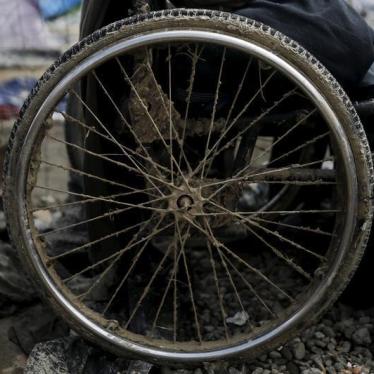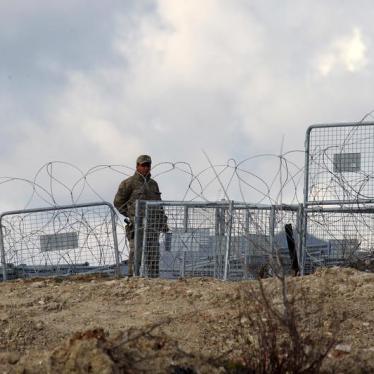Dear Prime Minister,
I am writing to you to convey Human Rights Watch’s profound concern about the proposed implementation of the European Union Joint Action Plan with Turkey and to urge you to reject the new elements discussed at the EU-Turkey summit meeting on March 7 at the forthcoming European Council on March 17-18. In our view, these new elements represent a disturbing disregard for international law covering the rights of refugees, asylum seekers, and migrants.
Human Rights Watch supports a dramatic increase in refugee resettlement from Turkey and other frontline states, and shares the hope that this possibility will convince Syrian refugees that they can reside in safety and dignity in Turkey and other countries of first asylum pending a durable solution to their plight. However, we caution against any suggestion of conditionality between refugee resettlement and the forced return of asylum seekers. Resettlement can be a very helpful supplement to asylum but can never be a substitute for the right to seek asylum.
We see three particularly harmful elements in the principles articulated on March 7: 1) fast-track mass returns to Turkey, 2) the proposal to resettle one Syrian refugee from Turkey for each irregularly arriving Syrian who is returned to Turkey; and 3) cooperation with Turkey on what appears to be the establishment of a “safe area” in Syria that would be used as a pretext to contain the flow of asylum seekers leaving that war-torn country.
We urge you to reject all three of these proposed elements. They are legally, morally, and politically wrong, and if implemented would signal a stark repudiation of international law and the very values on which the European Union was founded.
Fast-track returns violate the prohibition on collective expulsions and violate the right to seek asylum
The March 7 Statement of the EU Heads of State or Government calls for “comprehensive, large-scale and fast-track returns to Turkey of all irregular migrants not in need of international protection.” The contradiction at the heart of this plan is between fast-track large-scale returns—other words for collective expulsions, which are prohibited under the European Convention on Human Rights, Protocol 4, article 4—and the need to determine that a person being returned does not need international protection. EU and international refugee law requires that a claim for refugee status or subsidiary protection be given careful consideration, and that no one found to require such protection be forcibly returned.
According to the United Nations High Commissioner for Refugees, 91 percent of the sea arrivals to Greece in 2015 and thus far in 2016 come from the top ten refugee-producing countries in the world. These facts clearly undermine any presumption that people arriving by boat in Greece do not need international protection. Indeed, the composition of the groups on the boats arriving in Greece underline the importance of careful assessment of protection needs. In the absence of a clear indication that a migrant is making no claim for international protection or that his or her claim is manifestly unfounded, any claim for international protection should be carefully considered in a fair and complete examination, and no one with a valid claim should be returned.
Refugee resettlement should not be based on a quid pro quo that prevents other refugees from lodging asylum claims
The March 7 statement includes a commitment by the EU to “resettle, for every Syrian readmitted by Turkey from Greek islands, another Syrian from Turkey to the EU member states.” Each Syrian refugee is a person, not an interchangeable number to be traded for another Syrian refugee. Given that 98 percent of Syrian asylum claims in the EU are granted, there should be no distinction between recognized Syrian refugees and Syrian asylum seekers in terms of their presumptive need for international protection. The particular reasons why a Syrian refugee chose to leave Turkey irregularly by boat need to be assessed. It is simply wrong to assume that Syrians have no compelling reason to leave Turkey irregularly.
So-called safe areas are dangerous and have been used as a pretext for containment, not civilian protection
The March 7 Statement commits the EU to working with Turkey “in any joint endeavor to improve humanitarian conditions inside Syria which would allow for the local population and refugees to live in areas which will be more safe.” Turkey has made no secret of its desire to establish a “safe area” along a 68-mile stretch of its border with Syria. President Recep Tayyip Erdoğan said that “establishing a safe zone constitutes the basis of 1.7 million Syrian refugees' return." The wording of the March 7 Statement—“the local population and refugees”—indicates that such an area would be used for both returning refugees currently in Turkey as well as containing displaced Syrians still inside Syria.
Back in the 1990s, the Bosnian “safe areas” were also used as a pretext to contain the flow of refugees, but proved to be far from safe. Dutch peacekeepers who were sent to Srebrenica to guarantee its safety stood aside when Bosnian Serb forces rounded up its inhabitants and massacred thousands in a genocide, the worst atrocity in Europe since World War II. Now the EU appears to agree to a “joint endeavor” that does not even purport to make an area of Syria safe for civilians, but only “more safe” so refugees might be able to live there. No plans have been announced that would ensure the area in fact is “safe.”
Calling a place embroiled in conflict "safe" matters. The Geneva Conventions, one of the principal sources of the laws of war, use specific terms such as "neutralized zone" and "safety zone" to describe places such as hospitals that are deemed to be neutral, demilitarized, and therefore areas of safety that all parties to any conflict must respect. No one is remotely suggesting such truly safe places would be established along the Turkish border. The broader context of this agreement—to stem the migration flow to Europe—makes clear that this joint endeavor is intended not genuinely to protect Syrian civilians from harm, but rather to contain the flow of displaced people. It is more likely to be a death trap than a place of sanctuary.
…
The breach of the right to seek asylum is not mitigated by the fiction that Turkey is a “safe” country for all refugees. Turkey has granted “temporary protection” to more than two million Syrians but it refuses full refugee status for any non-Europeans. That selective reading of its refugee obligations partly explains why Turkey has repeatedly pushed Syrians back into the war zone and closed borders to others seeking to flee.
And the Syrians are the lucky ones: Afghans, Iraqis, and other refugees are not even given temporary protection by the Turkish government. Meanwhile, all refugees in Turkey are struggling to find work, educate their children, and build dignified lives—essential elements of a “safe” refuge.
Human Rights Watch is also deeply concerned that in the interests of securing the Joint Action Plan to stem the flow of refugees and migrants, the EU is willing to turn a blind-eye as Turkey’s president cracks down on human rights and dismantles Turkey’s democratic framework. This has been all too evident in the muted EU response to the near elimination of critical media as the Action Plan was being negotiated. The escalating conflict in the Southeast over the past few months suggests growing instability in Turkey and should be of grave concern. For the EU at such a moment to diminish its support for a rights-respecting Turkey dramatically transforms the terms of the EU-Turkey relationship and may even contribute to Turkey’s authoritarian slide.
A very different approach is needed. There is a compassionate and rights-based response that would better enable EU member states to manage migration and address security concerns. This should include: establishing sufficient safe and legal channels to protection, including large-scale resettlement for people found to be refugees, to reduce the incentive for people to take to boats; fair examination of asylum claims for those nonetheless still arriving irregularly in EU countries; equitable sharing of responsibility for asylum seekers and resettled refugees among EU states; vastly stepped-up support for the humanitarian needs, education and job opportunities of refugees in frontline states as pledged at the January London conference; and active engagement in addressing the root causes of violence and human rights abuses that force people from their homes.
We hope that you will pay serious consideration to the concerns expressed in this letter. Human Rights Watch would welcome the opportunity to discuss the issues raised in this letter with you or your staff.
Yours sincerely,
Kenneth Roth
Executive Director
Human Rights Watch








